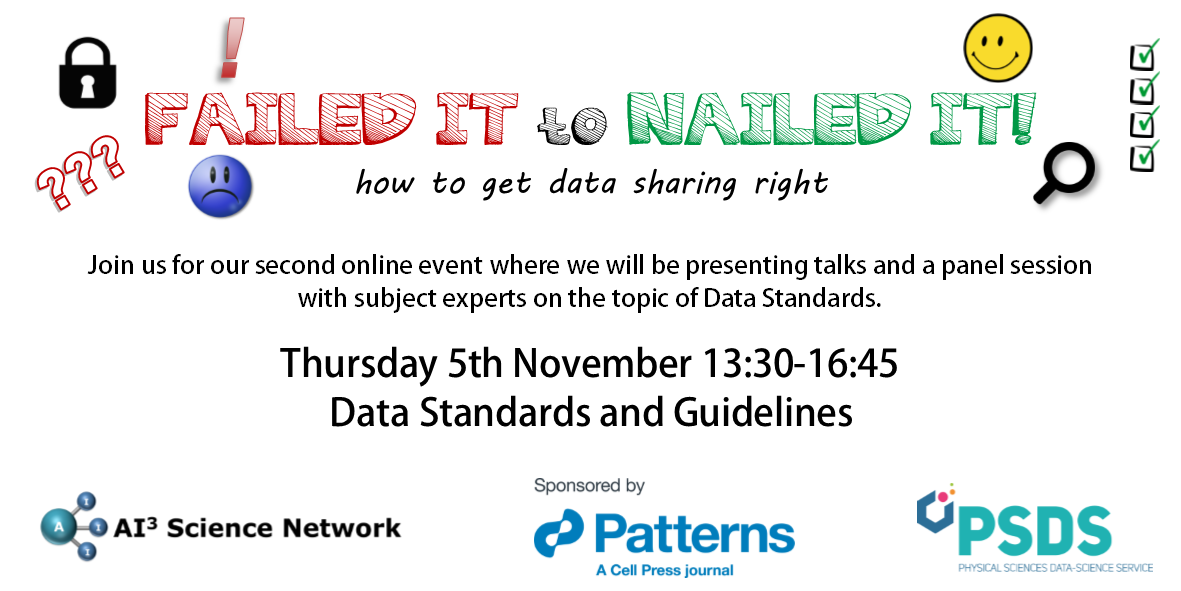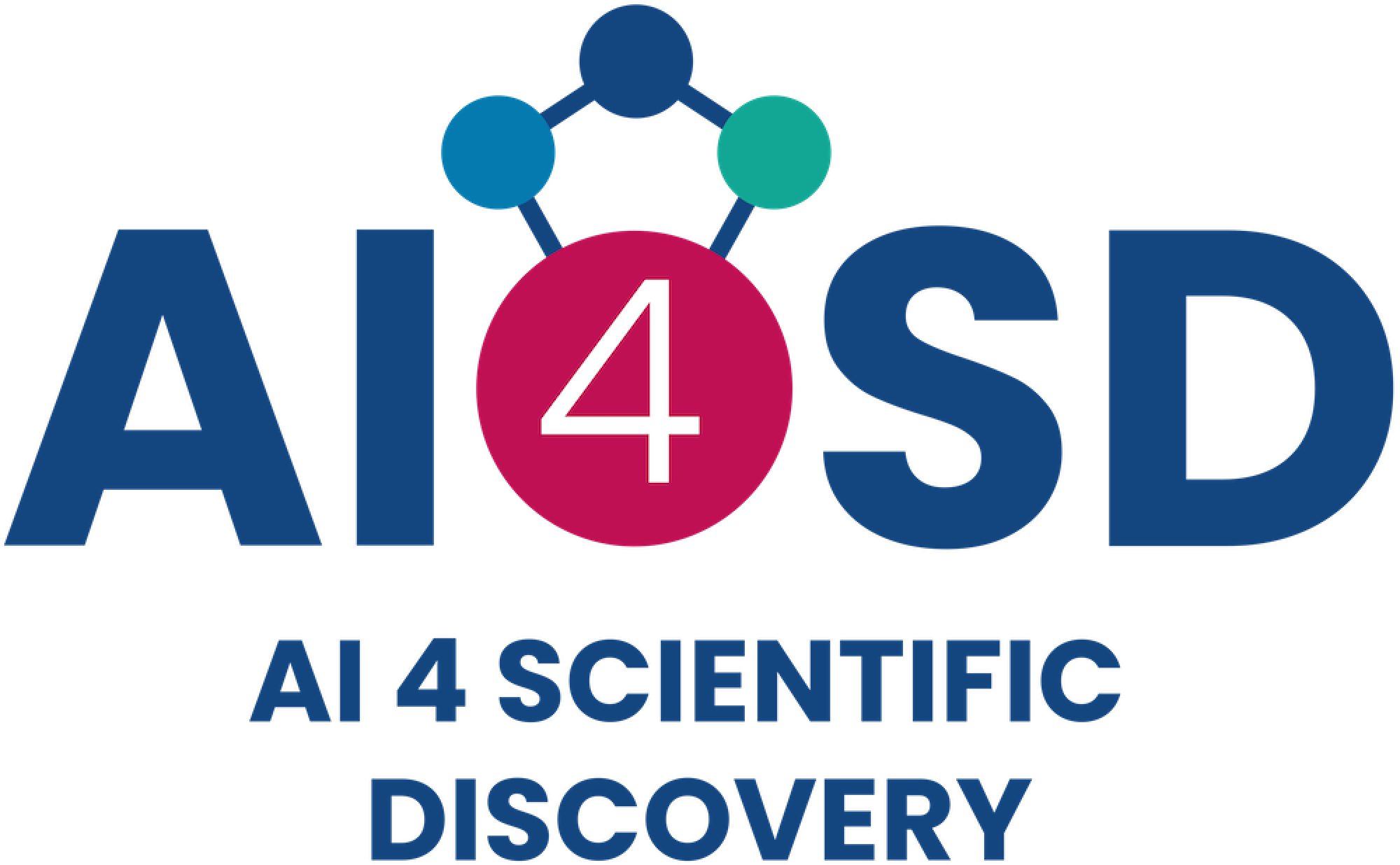
- This event has passed.
05/11/2020 – Failed it to Nailed it! How to get data sharing right! – Data Standards and Guidelines
5th November 2020 @ 1:30 pm - 4:45 pm
Free
|
**This event has now passed, click here for event coverage** |
Eventbrite Link: https://fi2ni-datastandards-051120.eventbrite.co.uk
This event forms part of the ‘Failed it to Nailed it – Getting Data Sharing Right’ series. This series is run by the Artificial Intelligence for Scientific Discovery Network+ (AI3SD), the Cell Press Patterns Journal and the Physical Sciences Data-Science Service (PSDS). These events are a product of the data sharing survey we ran earlier this year.
Description
This event is the second of four events in our ‘Failed it to Nailed it – Getting Data Sharing Right’ series. This event aims to provide best practice advice on different types of data standards, including metadata, open data and linked data. There will be three talks by experts in these areas, followed by a discussion panel on data standards.
This event is open to all, whether you are involved in research, data management, data policies or any other area! While our talks may have a slant towards scientific research they are designed to be suitable for attendees from all domains.
Agenda
- 13:30-13:45 – Introductions & Coffee
- 13:45-13:50 – Welcome Talk
- 13:50-14:20 – Data Generation, Data Standards and Metadata Capture in Drug Discovery (Dr Martin-Immanuel Bittner – Arctoris)
- 14:20-14:50 – Giving your Open Data the best chance to realise its potential (Mr Chris Gutteridge – University of Southampton)
- 14:50-15:20 – Coffee Break
- 15:20-15:25 – Introduction to Semantic Web Technologies (Dr Samantha Kanza – University of Southampton)
- 15:25-15:50 – Linked Data – Examples and Heuristics (Dr Terhi Nurmikko-Fuller – Australian National University)
- 15:50-16:35 – Panel Session (Dr Martin-Immanuel Bittner, Mr Chris Gutteridge, Dr Samantha Kanza)
- 16:35-16:45 – Sum Up & Close
Abstracts & Speaker Biographies
- Data generation, data standards, and metadata capture in drug discovery – Dr Martin-Immanuel Bittner: Biomedical research and drug discovery are based on a continuous cycle of scientific findings being made, refined, and translated into new treatments. However, over recent years it has become clear that only a fraction of all published research findings are actually reproducible, causing waste and delays in our efforts to bring new drugs to patients. The answer is changing the way we generate and capture data, including experimental metadata. Especially in light of the increasing role of Artificial Intelligence in drug discovery, it is critical to rethink the way we approach data generation as the most important input for AI-driven drug discovery. The talk will address these recent advances in data and metadata capture based on fully automated experimentation and novel data standards.
Bio: MD DPhil is the Chief Executive Officer of Arctoris, the world’s first fully automated drug discovery platform that he cofounded in 2016. He graduated as a medical doctor from the University of Freiburg in Germany, followed by his DPhil in Oncology as a Rhodes scholar at the University of Oxford. Martin has extensive research experience covering both clinical trials and preclinical drug discovery and is an active member of several leading cancer research organisations, including EACR, AACR, and ESTRO. In recognition of his research achievements, he was elected a member of the Young Academy of the German National Academy of Sciences in 2018. - Giving your open data the best chance to realise its potential – Mr Chris Gutteridge: Chris is not a researcher, but he’s worked with a lot of them over 23 years at the University of Southampton. He’s seen a lot of hard work on open data fail to achieve the potential it could have. A common issue is that rather than face the reality of what’s going wrong, it’s easier to invest more in the aspects of your dataset and data service that are good than to identify and fix aspects that are bad. Such “hygiene factors” don’t have to be perfect but they must all be good enough. Failure in any one may lead to failure of your data to achieve its potential, no matter how well you do on other factors. Chris will give some examples of the most common open data hygiene factors, and some tips from the public sector open data community on how to address them pragmatically.
Bio: Christopher Gutteridge is a Systems, Information and Web programmer, part of iSolutions in the School of Electronics and Computer Science at the University of Southampton. He is known for being the lead developer for EPrints and for being an advocate for Open Data, Linked Data and the Open Web. He has won several awards including The Times Higher Award (for the Southampton open data service) and the Jason Farradane Award “in recognition of outstanding contribution to the information profession”. - Linked Data – Examples and Heuristics – Dr Terhi Nurmikko-Fuller: With their inherent flexibility and robustness to change, the decentralised interconnected knowledge graphs that lie at the heart of semantic web technologies are ideally suited for the challenges of converting the messy, often incomplete, and internally heterogeneous datasets of the Humanities into machine processable data. Although a matter of some debate, the reuse and adoption of known ontologies, schema, and taxonomies across disparate projects across the Arts, Humanities, and Social Sciences landscape has been steadily increasing over the last decade in particular. This talk will describe the practical approaches and heuristics of such Linked Data projects, commenting on the effect of political, institutional, and socio-cultural factors in their planning, implementation, and evaluation.
Bio: Dr Nurmikko-Fuller is a Senior lecturer in Digital Humanities at the Australian National University. Her research involves interdisciplinary experimentation into the ways digital technologies can be used in the Humanities, Arts, and Social Sciences, including the role of gamification and informal online environments in education. She is a member of the Australian Government Linked Data Working Group, a Fellow of the Software Sustainability Institute, UK; and a eResearch South Australia (eRSA) HASS DEVL (Humanities Arts and Social Sciences Data Enhanced Virtual Laboratory) Champion, as well as iSchool Research Fellow at the Univeristy of Illinois at Urbana-Champaign, USA (2019 – 2021) and a British Library Researcher in Residence. In 2020, Dr Nurmikko-Fuller was appointed a member of the Territory Records Advisory Council, Territory Records Office, Treasury and Economic Development Directorate, Australian Capital Territory (ACT) Government. She is on the Steering Committee of Linked Pasts, an international consortium for Linked Data in the Humanities, and a Trustee of Conductive Music, a UK-based charity that focuses on providing educational resources that bring music, science, and creativity together in education.
